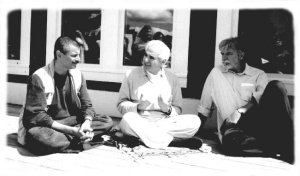
Shaikh Kabir Helminski, Imam Faisal Rauf, & Dr. Yannis Toussulis
Shaikh Kabir: Sufism has such a respect for the family that it says that unless one has a very good reason for not being married, one ought to be married. It is expressed as an obligation. Now, of course, in our society where things are so fragmented and the whole institution is challenged, a lot of people are out of that relationship. But it is a very important relationship for achieving our wholeness, for coming to know ourselves, for all the reasons we can imagine. It is also said marriage is for the comfort of the souls. It’s good to remember that. It’s not always supposed to be a challenge or an obligation in the sense of “loyalty above all else.’ We should be “a garment to each other,” is how it is expressed, and a comfort to each other.
Imam Feisal: I’d like to relate some of the other side of the question which I have in my mind. How does one relate some of the historical aspects or understandings of marriage within the Islamic tradition with the modern degree of great mobility? Until a century or so ago, a person generally lived and died within one society, in one environment and they had a relatively limited number of interactions, whereas today we are highly mobile. We travel, we come across a great number of people we are continually interacting with, at a frequency level which is up till now unprecedented. And I think some of the problems which are impinging upon these issues emanate from the increased quantity of the new types of interactions, and the qualitative differences in these interactions, which bring out challenges in terms of our own identity and our changing identity. We are changing so fast that when we interact with people, we evolve at such a rapid pace that within a short frame of time, your spouse is not the same person that you were married to five or ten years ago, where that would not be the so if you lived in a traditional society.
Dr. Toussulis: Al-Ghazzali lists what to look for in a mate, in a descending order. The first has to do with a person of faith, however we define that. And another one is that they be attractive – in other words, that they be suitable as an object of attraction. So the issue of sexual attraction was not left out by Al-Ghazzali . So here we have faith, and here we have human passion. One has to somehow rise over the other. In my own personal experience, if triangulation of the proper kind is not in a relationship where there are two people who acknowledge a third in between, then the relationship is doomed for failure. The third, let me use Christian terms, is the eternal Thou, or the Beloved. If people are trying to find God in each other, failure is almost guaranteed. If their principle love and devotion is not turned in a common way to a third which resides between and above them, it will fail or be of short duration. It is found in Ghazzali also. I’m using a more modern interpretation of the situation.
Imam Feisal: Let me just comment on this historically. You know the Prophet was married to women of different faiths, people of the Book, himself. Throughout the history of Islam many great figures, the males, were married to Christian females, to Jews. And in earlier times, people of other faiths. So surely there had to develop a common language coming from different perspectives. The pluralistic expression of Islam in relation to other beliefs has to be practiced at times in what some people call the inter-religious marriage. This can be a challenge, but I don’t think it obviates the possibility of the triangle you talk about.
Shaikh Kabir: Well, from a certain point of view, you can say, it’s all One. On the one hand, God is not this utterly separate thing. What we mean by God is something that gives Being to everything. And it is the higher dimension which allows relationship, allows love.
So it really is important in any relationship, on one hand, as Yannis said, to be aware of that third force so that you’re not merely in duality. But it is not as if that third force is other than your relationship. Your relationship is also the whole divine scenario. And this is in the case of Mevlana and Shams, and their relationship was not a romantic relationship, that can be proven very clearly, but it was a relationship in which, as something like equals, two beings inspired each other and God awakened through them. You know, let me give a beautiful statement from Sufism: “Lovers disappear in each other and in their disappearance, God emerges.”
Imam Feisal: My wife has an uncle who’s been married for a long time and when asked what his secret was, said, “Bed tea”, which means every morning she brings him tea in bed. And he said this in all seriousness. I mean, just one thing like that, you know.
Dr. Toussulis: I think what you’re pointing out that there is an adab in marriage. It is a kind of serving of each other, just as you would in the Tekke. It is very beautiful. When you do apply that kind of adab within an intimate relationship, you never have that kind of familiarity which begins to breed contempt.

